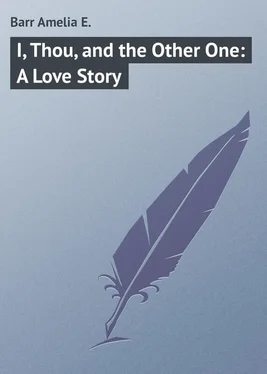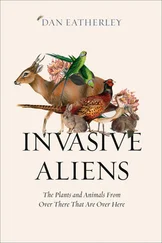Amelia Barr - I, Thou, and the Other One - A Love Story
Здесь есть возможность читать онлайн «Amelia Barr - I, Thou, and the Other One - A Love Story» — ознакомительный отрывок электронной книги совершенно бесплатно, а после прочтения отрывка купить полную версию. В некоторых случаях можно слушать аудио, скачать через торрент в формате fb2 и присутствует краткое содержание. Жанр: foreign_prose, на английском языке. Описание произведения, (предисловие) а так же отзывы посетителей доступны на портале библиотеки ЛибКат.
- Название:I, Thou, and the Other One: A Love Story
- Автор:
- Жанр:
- Год:неизвестен
- ISBN:нет данных
- Рейтинг книги:3 / 5. Голосов: 1
-
Избранное:Добавить в избранное
- Отзывы:
-
Ваша оценка:
- 60
- 1
- 2
- 3
- 4
- 5
I, Thou, and the Other One: A Love Story: краткое содержание, описание и аннотация
Предлагаем к чтению аннотацию, описание, краткое содержание или предисловие (зависит от того, что написал сам автор книги «I, Thou, and the Other One: A Love Story»). Если вы не нашли необходимую информацию о книге — напишите в комментариях, мы постараемся отыскать её.
I, Thou, and the Other One: A Love Story — читать онлайн ознакомительный отрывок
Ниже представлен текст книги, разбитый по страницам. Система сохранения места последней прочитанной страницы, позволяет с удобством читать онлайн бесплатно книгу «I, Thou, and the Other One: A Love Story», без необходимости каждый раз заново искать на чём Вы остановились. Поставьте закладку, и сможете в любой момент перейти на страницу, на которой закончили чтение.
Интервал:
Закладка:
In a few minutes the call was answered. Mrs. Atheling came hurriedly into the room. There was a pleasant smile on her large, handsome face, and she carried in her hands a bowl of cream and a loaf of white bread. “Why, John!” she exclaimed, “whatever is to do? I was getting a bit of supper for you. You are late home to-night, aren’t you?”
“I should think I was–all of an hour-and-a-half late.”
“But you are not ill, John? There is nothing wrong, I hope?”
“If things go a bit out of the common way, women always ask if they have gone wrong. I should think, they might as well go right.”
“So they might. Here is some fresh cream, John. I saw after it myself; and the haver-cake is toasted, and–”
“Nay, but I’ll have my drinking to-night, Maude. I have been flustered more than a little, I can tell thee that.”
“Then you shall have your drinking. We tapped a fresh barrel of old ale an hour ago. It is that strong and fine as never was; by the time you get to your third pint, you will be ready to make faces at Goliath.”
“Well, Maude, if making faces means making fight, there will be enough of that in every county of England soon,–if Dukes and Radical orators are to be believed.”
“Have you seen the Duke to-night?”
“I have. He has offered me a seat in the next Parliament. He thinks there is a big fight before us.”
“Parliament! And the Duke of Richmoor to seat you! Why, John, I am astonished!”
“I felt like I was dreaming. Now then, where is Kate? I want to tell the little maid about it. It will be a grand thing for Kate. She will have some chances in London, and I’ll warrant she is Yorkshire enough to take the best of them.”
“Kate was at Dashwood’s all the afternoon; and they were riding races; and she came home tired to death. I tucked her up in her bed an hour ago.”
“I am a bit disappointed; but things are mostly ordered that way. There is something else to tell you, Maude. I saw a stranger on the green throw Bill Verity and Adam Sedbergh; and I could not stand such nonsense as that, so I off with my coat and settled him.”
“You promised me that you would not ‘stand up’ any more, John. Some of them youngsters will give you a ‘throw’ that you won’t get easy over. And you out of practice too.”
“Out of practice! Nothing of the sort. What do you think I do with myself on wet afternoons? What could I do with myself, but go to the granary and have an hour or two’s play with Verity and Sedbergh, or any other of the lads that care to feel my grip? I have something else to tell you, Maude. I had a talk with this strange lad. He began some Reform nonsense; and I settled him very cleverly.”
“Poor lad!” She spoke sadly and absently, and it nettled the Squire. “I know what you are thinking, Mistress,” he said; “but the time has come when we are bound to stick to our own side.”
“The poor are suffering terribly, John. They are starved and driven to the last pinch. There never was anything like it before.”
“Women are a soft lot; it would not do to give up to their notions.”
“If you mean that women have soft hearts, it is a good thing for men that women are that way made.”
“I have not done with my wonders yet. Who do you think was with the Duke?”
“I don’t know, and I can’t say that I care.”
“Yes, but you do. It was Lord Exham. He said this and that about you, but I did not take much notice of his fine words.” Then he rose and pushed his chair aside, and as he left the room added,–
“That stranger lad I had the tussle with to-night says he knows your son Edgar–that they have lived and worked together for a year,–a very unlikely thing.”
“Stop a minute, Squire. Are you not ashamed of yourself to keep this news for a tag-end? Why it is the best thing I have heard to-night; and I’ll be bound you let it go past you like a waft of wind. What did you ask the stranger about my son?”
“Nothing. Not a word.”
“It was like your stubborn heart. My son indeed! If ever you had a son, it is Edgar. You were just like him when I married you–not as handsome–but very near; and you are as like as two garden peas in your pride, and self-will, and foolish anger. Don’t talk to me of Dukes, and Lords, and Parliaments, and wrestling matches. I want to hear about my son. If you have nothing to say about Edgar, I care little for your other news.”
“Why, Maude! Whatever is the matter with you? I have lived with you thirty years, and it seems that I have never known you yet.”
“But I know you, John Atheling. And I am ashamed of myself for having made nothing better out of you in thirty years. I thought I had you better shaped than you appear to be.”
“I shall need nothing but my shroud, when thou, or any other mortal, shapest me.”
“Fiddlesticks! Go away with your pride! I have shaped everything for you,–your house, and your eating; your clothes, and your religion; and if I had ever thought you would have fallen into Duke Richmoor’s hands, I would have shaped your politics before this time of day.”
“Now, Maude, thou canst easily go further than thou canst come back, if thou dost not take care. Thou must remember that I am thy lord and husband.”
“To be sure, thou hast that name. But thou hast always found it best to do as thy lady and mistress told thee to do; and if ever thou didst take thy own way, sorry enough thou hast been for it. Talk of clay in the hands of the potter! Clay is free and independent to what a man is in the hands of his wife. Now, John, go to bed. I won’t speak to thee again till I find out something about my son Edgar.”
“Very well, Madame.”
“I have been thy guardian angel for thirty years”–and Mrs. Atheling put her head in her hands, and began to cry a little. The Squire could not bear that argument; he turned backward a few steps, and said in a more conciliatory voice,–
“Come now, Maude. Thou hast been my master for thirty years; for that is what thou meanest by ‘guardian angel.’ But there is nothing worth crying about. I thought I had brought news that would set thee up a bit; but women are never satisfied. What dost thou want more?”
“I want thee to go in the morning and find out all about Edgar. I want thee to bring his friend up here. I would like to question him myself.”
“I will not do it.”
“Then thou oughtest to be ashamed of thyself for as cruel, and stubborn, and ill-conditioned a father as I know of. John, dear John, I am very unhappy about the lad. He went away without a rag of his best clothes. There’s the twelve fine linen shirts Kitty made him, backstitched and everything, lying in his drawers yet, and his top-coat hanging on the peg in his room, and his hat and cane so natural like; and he never was a lad to take care of his health; and so–”
“Now, Maude, I have humbled a bit to thee many a time; and I don’t mind it at all; for thou art only a woman–and a woman and a wife can blackguard a man as no other body has either the right or the power to do–but I will not humble to Edgar Atheling. No, I won’t! He is about as bad a prodigal son as any father could have.”
“Well, I never! Putting thy own son down with harlots and swine, and such like!”
“I do nothing of the sort, Maude. There’s all kinds of prodigals. Has not Edgar left his home and gone away with Radicals and Reformers, and poor, discontented beggars of all makes and kinds? Happen, I could have forgiven him easier if it had been a bit of pleasuring,–wine and a bonny lass, or a race-horse or two. But mechanics’ meetings, and pandering to ranting Radicals–I call it scandalous!”
“Edgar has a good heart.”
Читать дальшеИнтервал:
Закладка:
Похожие книги на «I, Thou, and the Other One: A Love Story»
Представляем Вашему вниманию похожие книги на «I, Thou, and the Other One: A Love Story» списком для выбора. Мы отобрали схожую по названию и смыслу литературу в надежде предоставить читателям больше вариантов отыскать новые, интересные, ещё непрочитанные произведения.
Обсуждение, отзывы о книге «I, Thou, and the Other One: A Love Story» и просто собственные мнения читателей. Оставьте ваши комментарии, напишите, что Вы думаете о произведении, его смысле или главных героях. Укажите что конкретно понравилось, а что нет, и почему Вы так считаете.












